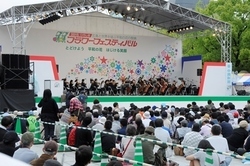Daegu Metropolitan City (Republic of Korea)

Sister City Agreement
Established May 2, 1997 (date of Agreement signing and Hiroshima City Council approval)
Daegu Facts and Figures
Who's in charge?
Mayor Kwon Young-jin (assumed office July 1, 2014)
How many people live there?
Approximately 2.5 million people
How big is Daegu?
Area: 883.68 km2 (approximately the same size as Hiroshima City)
Where is it?
Located in the southeast of Korea, approximately 330 km southeast of Seoul and 100 km northwest of Busan.
What's the weather like?
Extreme temperatures with frequent dry days resulting from continental climate. Average temperatures are 16.2°C in September and 1.9°C in March.
Get to Know Daegu
Daegu Metropolitan City* is located in southeast Korea and situated where the Geumho River meets with the Nakdong River, the second largest river in Korea, and its subsidiary, the Shincheon Stream, in an inland basin surrounded by the mountains of Mt. Palgongsan and Mt. Biseulsan.
During the 1st century, a tribal state called Dalgubeol took shape in the hilly region. With the establishment of the Gyeongsang-gamyeong in 1601, the governor's office which commanded the administration, judicature, and military services of the Gyeongsangdo Province (present Gyeongbuk and Gyeongnam Provinces), Daegu has long been an important point of transportation between Seoul and Busan, and developed as the economic, academic and cultural center of the Yeongnam Region. The city is also known as a center for the Korean medicine trade.
During the 1930s, the textile industry developed in Daegu and came to occupy a central position in the city's economy. The city currently aims to encourage the higher value-added industries of fashion, design, and apparel. Other prospering industries in the city are machine equipment, automobile parts, frames for glasses, umbrellas, and aluminium products. In August 2009, Daegu was designated as the site for the high-tech medical cluster project by the central government.
Aside from its many noted temples, such as Donghwa Temple, and numerous cultural assets, the city strives to promote tourism, particularly to nearby Gyeongju City, Andong City, and Haeinsa Temple.
Daegu is also home to the Samsung Lions and the Daegu Football Club, hosting the FIFA World Cup 2002, the Summer Universiade 2003, and the 13th IAAF World Championships in Athletics in August 2011.
*Metropolitan city: Cities which have the same authority as do (provinces) that are directly administered by the Korean Government. Daegu was placed under the direct administration of the central government in 1981 and then renamed as a Metropolitan City in 1995. There are five other cities of metropolitan status in Korea: Busan, Inchon, Gwangju, Daejon, and Ulsan. Seoul has the status of Special City.
A Little History About Our Sister City Agreement
The exchanges that commenced with Daegu Metropolitan City in the 1980s initially focused on the area of sports. However, the turning point came in 1994 when Hiroshima hosted the Asian Games and the idea of citizen exchange between Asian countries began to take root and strengthened the desire to promote friendship between Japan and Korea.
Exchanges with Daegu Metropolitan City include not only the alternate hosting of friendly sports meetings and reciprocal visits by women's groups, but also forging of sister city ties between Hiroshima and Daegu through private groups representing private universities, broadcasting companies, and tax accountants. The impetus to establish the sister city relationship was also strengthened through the exchange of elementary school groups and visits to Daegu made by citizen delegations which as the Goodwill Wings and the Youth Goodwill Wings groups.
The sister city agreement between Hiroshima and Daegu was signed in Hiroshima on May 2, 1997, by the Mayors and City Council Chairpersons of both cities. The agreement states their will to "further increase the continued development of both cities, deepen mutual understanding and friendship between citizens, and contribute to world peace."

Building Bridges Through Exchange
Exchanges between Hiroshima and Daegu, such as those of Japanese-Korean exchange groups and groups of Korean residents in Japan, were thriving even prior to the agreement. There are a total of over 20 groups, including among them lawyer, youth, and cultural activity groups, which have established ties with counterparts in Korea and are actively working to promote exchange.
The Flower Festival in Hiroshima and the Colorful Daegu Festival as well as the Chicken Beer Festival are held for citizens of each city, and delegations, song and dance performers, and musical bands travel to their respective sister cities to participate in these events reciprocally. Such exchanges allow the cities to both introduce traditions and arts from their respective countries and deepen mutual friendship and understanding.
Exchanges are being widened across a broad range of areas, such as a youth exchange project for alternate visits by both cities' high school students, the participation of companies in Daegu in the Chugoku-Shikoku Business Fair in Hiroshima, participation of Hiroshima's university students in University Students Camp in Daegu, and sports acitivities.
2015 marked the 50th anniversary of the normalization of Japan-ROK relations, and in May, Mayor Kwon Young-jin and Vice Mayor Kim Yon Chang accompanied by a delegation of city representatives and an artistic delegation (Daegu Symphony Orchestra), all in all totaling 151 people, came to Hiroshima and met with Mayor Matsui. Mayor Kwon Young-jin was awarded special citizenship in Hiroshima, and furthermore, upon the 20th anniversary of sister city relations, the Mayor of Daegu Metropolian City along with 98 people visited Hiroshima in May 2018. In addition to a commemorative ceremony, Daegu Metropolitan Opera and Hiroshima Symphony Orchestra joined together to stage an opera performance. In September of the same year, to coincide with the opening of the 2017 Daegu International Choir Festival, a delegation of Hiroshima City representatives and an artistic delegation totaling 39 people traveled to Daegu.
Inquiries regarding this page
Internationalization Division, Citizens Affairs Bureau
1-6-34 Kokutaiji-machi, Naka-ku, Hiroshima
Phone: +81-82-504-2106 / Fax: +81-82-249-6460
Mail: [email protected]
